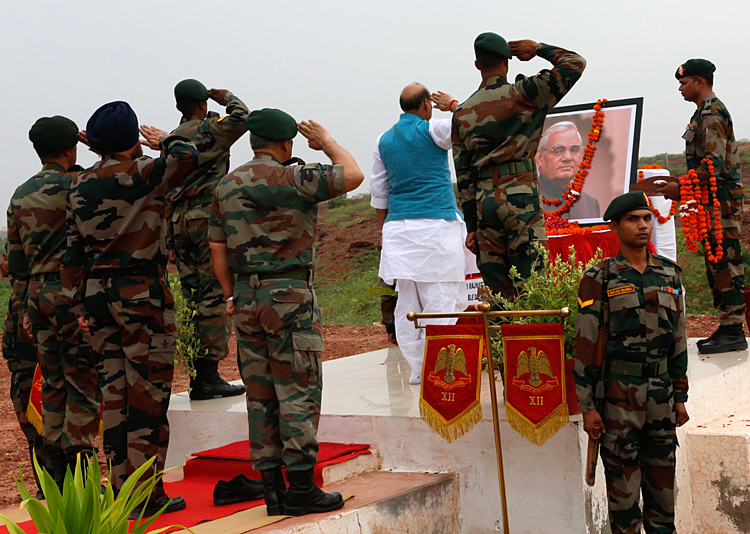- Prime Minister Narendra Modi inaugurates Aero India 2023 in Bengaluru; Releases Commemorative Stamp
- Defence Secretary meets delegations from Saudi Arabia, USA and Oman on the sidelines of Aero India 2023
- Foreign Ministers of 32 countries to attend Aero India 2023
- Embraer showcases the C-390 Millennium at Aero India 2023
India could shed No First Use Nuclear Weapons doctrine in future: Rajnath Singh
Defence Minister makes declaration of intent on a day when the UNSC is discussing Pak complaint on revocation of Article 370 in Kashmir

Defence Minister Rajnath Singh on August 16 indicated that India may drop the cornerstone 'No First Use' caveat in its Nuclear Doctrine depending upon circumstances in the future.
He dropped this hint on Twitter after paying homage to former Prime Minister Atal Bihari Vajpayee at Pokhran - the site of India's nuclear detonations in 1998 - on the occasion of the deceased leader's first death anniversary. The Vajpayee Government had taken the decision to declare India a nuclear weapons state by detonating five nuclear devices at Pokhran in May 1998.
"Pokhran is an area which witnessed Atal Ji's firm resolve to make India a nuclear power and yet remain firmly committed to the doctrine of 'No First Use'. India has strictly adhered to this doctrine. What happens in future depends on the circumstances," the Defence Minister Tweeted.
Pokhran is the area which witnessed Atal Ji’s firm resolve to make India a nuclear power and yet remain firmly committed to the doctrine of ‘No First Use’. India has strictly adhered to this doctrine. What happens in future depends on the circumstances.
— Rajnath Singh (@rajnathsingh) August 16, 2019
India's Defence Minister made the declaration of intent about a possible revision of India's Nuclear Doctrine on a day when the UN Security Council is holding a closed door meeting on the revocation of Article 370 in Jammu and Kashmir by the Government of India. The discussion is taking place at the instance of permanent member China, which lobbied Poland for a discussion on a letter written by Pakistan Foreign Minister Shah Mahmood Qureshi. Poland holds the presidency of the UN Security Council.
Singh was in the Jaisalmer district of Rajasthan in which Pokhran is located to preside over the closing ceremony of the International Scout Masters Competition, a military games contest in which eight countries were participating.
"It is a coincidence that I'm in Jaisalmer when the nation is observing Atalji first 'Punyatithi'. I shall be visiting Pokhran immediately visiting Pokhran after the programme in Jaisalmer and to pay my respects and tributes to Atalji on his death anniversary," the Defence Minister Tweeted earlier, giving context to his visit.
The Vajpayee Government declared the policy of No First Use soon after the nuclear detonations at Pokhran in 1998, seeking to placate international opinion in the wake of the Tests. The Indian doctrine pitched it as a minimalist, defensive Nuclear Weapons power aimed at deterring nuclear threats from its neighbourhood
"India attaining the status of a responsible nuclear nation became a matter of national pride for every citizen of this country. The nation will remain indebted to the greatness of Atal Ji," he Tweeted further after paying homage to Vajpayee at Pokhran.
The view that India's policy of No First Use must be corrected in the face of open threats by Pakistan to use nuclear weapons to force re-drawing of boundaries in Jammu and Kashmir has been gathering momentum in a section of India's strategic community.
A statement in 2016 by the then Defence Minister Manohar Parrikar, questioning the need for sticking to the policy of No First Use had generated heated debate.
"I wonder why we say that we don't use nuclear weapons first. It doesn't mean that India has to use nukes, but why rule out. This is my thinking. Some may say Parrikar says nuclear doctrine has changed. It has not changed in any Government policy," he said at an event to release a book on a security strategy for India.
"People say India has No First Use Nuclear concept. I should say that I'm a responsible nuclear power and I will not use it irresponsibly. If written down strategy exists or you take a stand on a nuclear aspect, I think you are actually giving away your strength in Nuclear (sic)," the late Parrikar had then remarked.
The view expressed by Rajnath Singh on August 16 and Manohar Parrikar three years ago is that India should now move away from the self-imposed constraints of a recessed nuclear power and instead project itself a responsible nuclear power with a flexible posture, not yielding initiative to an adversary who could exploit its doctrinal restraint
He was giving voice to the opinion that doctrinal restraint may hurt Indian interests.
Following Parrikar's remarks, the Ministry of Defence had put out a disclaimer, stating that the Minister's "personal opinion" did not reflect the official position of the Government of India.
The Vajpayee Government declared the policy of No First Use soon after the nuclear detonations at Pokhran in 1998, seeking to placate international opinion in the wake of the Tests. The Indian doctrine pitched it as a minimalist, defensive Nuclear Weapons power aimed at deterring nuclear threats from its neighbourhood. It also pledged non-use against non-nuclear weapon states and linked it to the eventual ideological goal of global nuclear disarmament.
The view expressed by Rajnath Singh on August 16 and Manohar Parrikar three years ago is that India should now move away from the self-imposed constraints of a recessed nuclear power and instead project itself a responsible nuclear power with a flexible posture, not yielding initiative to an adversary who could exploit its doctrinal restraint.





